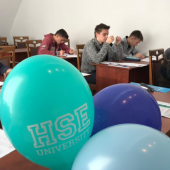The U.S. has some of the world’s best colleges, though they are also among the world’s most expensive. It’s worth it though, if you get into a top-notch school and study an in-demand subject like business or computer science.
Many people rely on family members for financial support, but a gift or loan from family often comes with certain conditions—what Americans call “strings attached.” Plus, this could mean financial hardship for your relatives; they may need to put plans for the family business on hold, or sell their home or other assets. And often, even when family members are willing to co-sign a bank loan, the family’s assets are insufficient to serve as collateral… and so the loan is denied.
If this is the situation you find yourself in, what can you do? Read on to find out!
Win a Scholarship in 4 Easy Steps
Maximize your chances of winning a scholarship to study in the USA or Canada by following these four easy steps:
1. Identify scholarships for which you are eligible by contacting your school’s Office of International Student Services/Office of Financial Aid to ask about scholarships. You can also search the College Board’s website for scholarships available to students from your school.
Search scholarship engines like IEFA and FastWeb. Be sure to use your school, your degree/major, and your country of origin as search terms. Also investigate in-country sources of scholarship funds, including government-run scholarship programs like ColFuturo in Colombia and FUNED in Mexico.
2. Prioritize applying to those scholarships for which you are most competitive. Remember that you are more likely to win scholarship competitions with more limited applicant pools. Find those that apply to you most closely!
3. Write a compelling application and essay. That means you should:
- Make your essay memorable – Include specific details about yourself;
- Write in proper, formal English – Use the correct grammar, punctuation, and spelling;
- Write in a clear, logical format;
- Demonstrate that you excel when judged against the judging criteria;
- Do not copy and paste a generic statement.
4. Submit all required materials by the deadline, taking into account any differences in time zones.
Earn Money While Studying
Work-study, or working on campus part-time, is a good option available to international students. These jobs can include working with a professor as a grader who marks exams or as a teaching assistant who conducts classes, tutoring other students in various subjects, or even working the campus library or computer lab. International students are legally allowed to work an average of 20 hours per week on-campus in the US.
Once you arrive in the USA, you can also explore local internships.
In addition to helping defray the cost of your education, these opportunities can also help build your CV!
Get a No-Cosigner Loan
Most likely, even if you win multiple scholarships and plan to have a part-time job, you will still face a financial shortfall. That’s where a loan comes in.
While rare, there are a few companies that offer loans without requiring your parents—or anyone else—to co-sign the loan or provide collateral (such as a house, loan, or jewelry). These companies make their credit decision based on your future ability to pay and factor in your past employment history, the reputation of the university you plan to attend, and your future employment prospects.
When evaluating loan options, you should consider:
- Whether the interest rate is fixed or variable. Variable interest rate loans, also known as floating rate loans are loans in which interest rates change based on market fluctuations. Variable interest rates are determined by two components: a benchmark and a spread. Lenders usually peg the benchmark to an index such as the London Interbank Offered Rate (LIBOR). So, a variable rate might be quoted as “LIBOR + 7%.” The means if LIBOR is 4%, your interest rate is 11%--but if LIBOR shoots up to 7%, your interest rate will be 14%! A fixed rate means you will always pay the same interest rate, so you will know exactly what your loan payments will be.
- Whether there are any penalties for prepayment. Ideally, you should be able to pay off your loan early (if, for example, you land that amazing job with the huge salary, or win the lottery!) without penalty.
- What your monthly payment will be. You want to make sure that you’ll be able to afford your payments after graduation. As a good rule of thumb, your monthly debt payments—including student loan payments—should not exceed 15 percent of your expected monthly income.
- The currency in which you’ll be expected to make payments, and the currency in which you expect to get paid after graduation. Why is this important? Because if you earn money in one currency and pay bills in another, you incur what’s called “currency risk.” As an example, let’s say you that you borrow money in UK pounds, with a monthly payment of £300, to go to a university in the USA. After graduation, you decide to stay in the USA and get a great job in software engineering and are paid a monthly salary of $7,000. At today’s exchange rate ($1.27 = £1), that payment equates to about $380 dollars, a very manageable payment on that salary. But if the exchange rate becomes $1.80 = £1, then that same £300 monthly payment will cost you $540.
Interested in applying for a no-cosigner loan?
We recommend checking out MPOWER Financing, the world’s only provider of fixed-rate, no-cosigner loans for international students. These loans are particularly attractive if you are planning to stay in the USA after graduation, as they are denominated in US dollars. They also provide support letters to help students secure a student visa and offer several interest rate discounts!
MPower has numerous advantages over other international lenders, making their product unique. These include:
- Fixed rates - your rate never increases
- No restrictions on majors or programs
- Loans available at over 300 US and Canadian universities
- No cross-border payment transaction fees
- Interest rate discounts
- Builds USA credit and may offer USA tax advantages
While you’re on MPOWER’s website, also check out their scholarships. They offer over $65,000 in scholarships exclusively for international students.
 No-Cosigner Loan
No-Cosigner Loan










